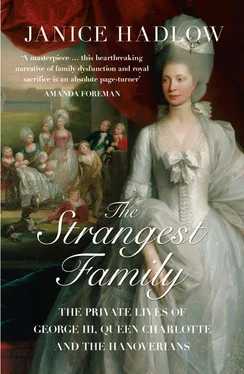From the mid-1750s to the time of his accession, the entire object of George’s existence was to reshape and remodel himself into the type of man who could fulfil the role of king, as Bute had so alluringly redefined it; but this internal reformation was not accompanied by a change in his way of life. He remained closeted at home with his mother and the earl, and for all Bute’s desire to reform the prince’s personality, he left many of George’s deepest beliefs untouched – partly because he shared some of them himself. One of the reasons George found Bute so congenial was because he endorsed so much of the vision of the world that the prince had inherited from his mother. For all his confidence in the righteousness of his prescriptions, and for all the energy and enthusiasm with which he argued them, there was in Bute himself a core of austerity and reserve. He was not a naturally sociable man, preferring to judge society – often rather severely – than to engage with it. He had a natural sympathy with the suspicion and apprehension with which Augusta encountered anything beyond the narrow bounds of her immediate family. He offered George no alternative perspective, but instead confirmed the prince’s pessimism about the moral worth and motives of others, a bleak scepticism that was to endure throughout his life. ‘This,’ wrote George, ‘is I believe, the wickedest age that ever was seen; an honest man must wish himself out of it; I begin to be sick of things I daily see; for ingratitude, avarice and ambition are the principles men act by.’ 108
Bute’s counsels did nothing to dilute the mix of fear and contempt with which the prince contemplated the world he must one day join. ‘I look upon the majority of politicians as intent on their own private interests rather than of the public,’ George wrote with grim certainty. 109William Pitt, his grandfather’s minister, was ‘the blackest of hearts’. His uncle, Cumberland, was still, George believed, capable of mounting a coup d’état to prevent his accession: ‘in the hands of these myrmidons of the blackest kind, I imagine any invader with a handful of men might put himself on the throne and establish despotism here’. 110He had fully absorbed Augusta’s deep-seated hostility to his grandfather and, like her, could not find a good word to say about ‘this Old Man’. George II’s behaviour was ‘shuffling’ and ‘unworthy of a British monarch; the conduct of this old king makes me ashamed of being his grandson’. 111There was only one man deserving of George’s confidence, and that was Bute. ‘As for honesty,’ he told Bute, ‘I have already lived long enough to know you are the only man I shall ever meet who possesses that quality and who at all times prefers my interest to their own; if I were to utter all the sentiments of my heart on that subject, you would be troubled with quires of paper.’ 112
By 1759, Bute’s ascendancy over the prince seemed complete. The prospect of translating their political ideas into practice once George II was dead offered a beacon of hope which sustained them through adversity – it had been agreed at the very outset of their relationship that Bute was to become First Lord of the Treasury when George was king. But in that year, the earl’s authority was challenged from a direction that neither he and nor perhaps George himself had anticipated.
*
In the winter, conducting one of his regular inventories of George’s state of mind, Bute became convinced the prince was hiding something from him. Pressed to declare himself, George was cautious at first, but eventually began a hesitant explanation of his mood. At first, he confined himself to generalities. ‘You have often accused me of growing grave and thoughtful,’ he confessed. ‘It is entirely owing to a daily increasing admiration of the fair sex, which I am attempting with all the philosophy and resolution I am capable of, to keep under. I should be ashamed,’ he wrote ruefully, ‘after having so long resisted the charms of those divine creatures, now to become their prey.’ 113There was no doubt that the twenty-one-year-old George was still a virgin. His younger brother Edward, far more like his father and grandfather in his tastes, had eagerly embarked on affairs as soon as he had escaped the schoolroom, but George had thus far remained true to his mother’s principles of self-denial and restraint. Walpole believed that if she could, Augusta would have preferred to keep her son perpetually away from the lures of designing women: ‘Could she have chained up his body as she did his mind, it is probable that she would have preferred him to remain single.’ But the worldly diarist thought he knew the Hanoverian temperament well enough to be convinced this was an impossible objective. ‘Though his chastity had hitherto remained to all appearances inviolate, notwithstanding his age and sanguine complexion, it was not to be expected such a fast could be longer observed.’ 114Certainly this was how the prince himself felt, confessing to Bute that he found repressing his desires harder and harder. ‘You will plainly feel how strong a struggle there is between the boiling youth of 21 years and prudence.’ He hoped ‘the last will ever keep the upper hand, indeed if I can but weather it, marriage will put a stop to this conflict in my breast’. 115
As Bute suspected, George’s disquiet reflected something more than a general sense of frustration. Incapable of concealing anything of importance from Bute, he wrote another letter which confessed all. ‘What I now lay before you, I never intend to communicate to anyone; the truth is, the Duke of Richmond’s sister arrived from Ireland towards the middle of November. I was struck with her first appearance at St James’s, and my passion has increased every time I have since beheld her; her voice is sweet, she seems sensible … in short, she is everything I can form to myself lovely.’ Since then, his life had hardly been his own: ‘I am grown daily unhappy, sleep has left me, which was never before interrupted by any reverse of fortune.’ He could not bear to see other men speak to her. ‘The other day, I heard it suggested that the Duke of Marlborough made up to her. I shifted my grief till I retired to my chamber where I remained for several hours in the depth of despair.’ His love and his intentions were, he insisted, entirely honourable: ‘I protest before God, I never have had any improper thoughts with regard to her; I don’t deny having flattered myself with hopes that one day or another you would consent to my raising her to a throne. Thus I mince nothing to you.’ 116
Lady Sarah Lennox, daughter of the Duke of Richmond (which title her brother inherited), was almost as well connected as George himself. Her grandfather was a son of Charles II and his mistress Louise de Kérouaille. She had four sisters, three of whom had done very well in the marriage market. The eldest, Caroline, was wife to the politician Henry Fox, and mother to Charles. Emily had married the Earl of Kildare, and Louisa had made an alliance with an Irish landowner, Thomas Connolly. From her youth, Sarah was one of the liveliest members of a famously lively family. As a very small child, she had caught the eye of George II. He had invited her to the palace where she would watch the king at his favourite pastime, ‘counting his money which he used to receive regularly every morning’. Once, with heavy-handed playfulness, he had ‘snatched her up in his arms, and after depositing her in a large china jar, shut down the lid to prove her courage’. 117When her response was to sing loudly rather than to cry, he was delighted.
When her mother died, Sarah went to live with her sister, Lady Kildare, in Ireland. She did not return to court until she was fourteen. George II, who had not forgotten her, was pleased to see her back, but ‘began to joke and play with her as if she were still a child of five. She naturally coloured up and shrank from this unaccustomed familiarity, became abashed and silent.’ The king was disappointed and declared: ‘Pooh! She’s grown quite stupid!’ 118
Читать дальше












